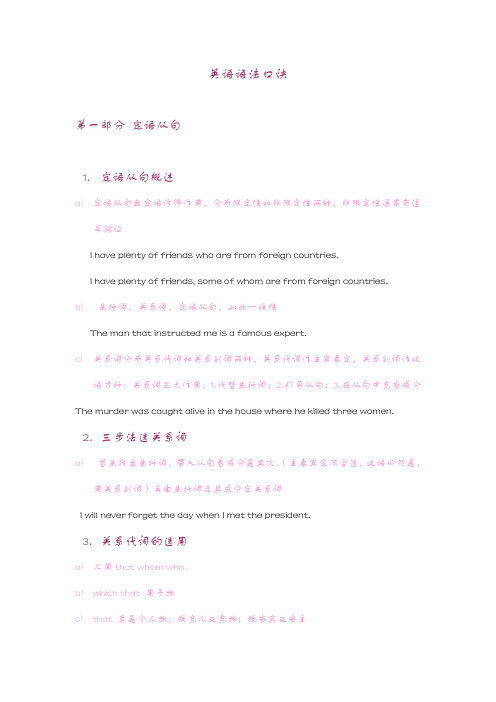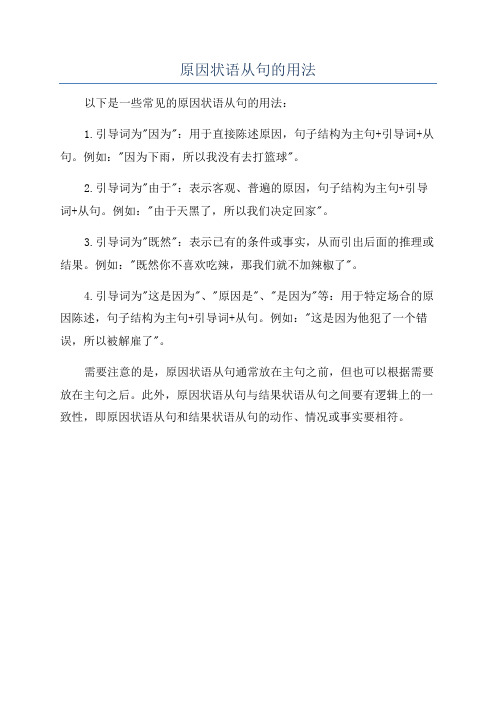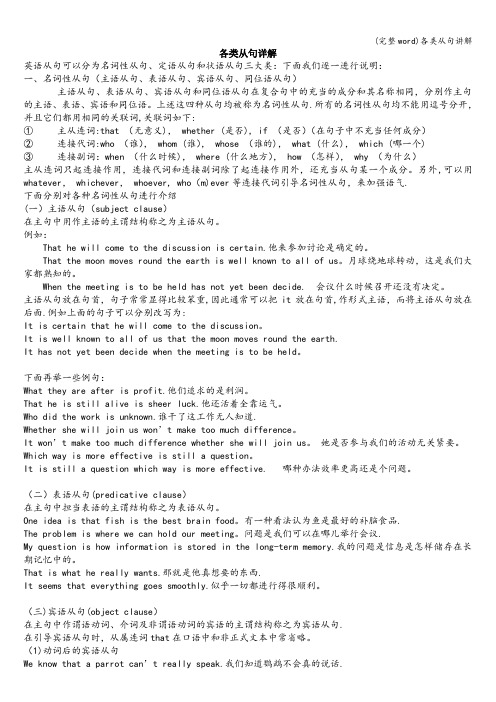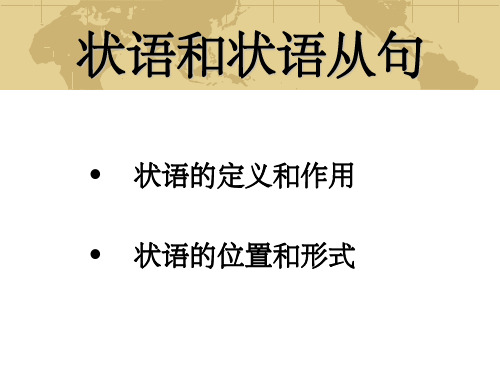完整word版,原因状语从句语法讲解
(完整word版)状语从句语法口诀

英语语法口诀第一部分定语从句1.定语从句概述a)定语从句起定语修饰作用,分为限定性和非限定性两种,非限定性通常有逗号验证I have plenty of friends who are from foreign countries.I have plenty of friends, some of whom are from foreign countries.b)先行词,关系词,定语从句,如此一线性The man that instructed me is a famous expert.c)关系词分为关系代词和关系副词两种,关系代词作主宾表定,关系副词作状语才行:关系词三大作用:1.代替先行词;2.引导从句;3.在从句中充当成分The murder was caught alive in the house where he killed three women.2.三步法选关系词a)首先找出先行词,带入从句看成分是其次,(主表宾定不合适,状语必然是,用关系副词)再由先行词及其成分定关系词I will never forget the day when I met the president.3.关系代词的选用a)人用that whom who。
b)which that 用于物c)that 真是个人物,既充人又充物;既当宾又当主d)whom 只做宾,which that who 既宾又主e)whose 作定语(=名词+of which),不分人或物The tall house whose windows face the south is my office.4.关系副词的选用a)先行词the time,需用关系副词时,用when 才可以若关系词在从句中充当状语,则关系词应用when,the time +when(=on which)I will never forget the days when I lived with you happily.I will never forget the days which I spent learning English .b)先行词the place,需用关系副词时,where来效力若关系词在从句中充当状语。
原因状语从句的用法

原因状语从句的用法
以下是一些常见的原因状语从句的用法:
1.引导词为"因为":用于直接陈述原因,句子结构为主句+引导词+从句。
例如:"因为下雨,所以我没有去打篮球"。
2.引导词为"由于":表示客观、普遍的原因,句子结构为主句+引导词+从句。
例如:"由于天黑了,所以我们决定回家"。
3.引导词为"既然":表示已有的条件或事实,从而引出后面的推理或结果。
例如:"既然你不喜欢吃辣,那我们就不加辣椒了"。
4.引导词为"这是因为"、"原因是"、"是因为"等:用于特定场合的原因陈述,句子结构为主句+引导词+从句。
例如:"这是因为他犯了一个错误,所以被解雇了"。
需要注意的是,原因状语从句通常放在主句之前,但也可以根据需要放在主句之后。
此外,原因状语从句与结果状语从句之间要有逻辑上的一致性,即原因状语从句和结果状语从句的动作、情况或事实要相符。
原因状语从句

1、定义:在句中用来说明主句原因的句子叫原因状语从句。
2、常用引导词: because(因为), as (由于), since (既然), now (that) (既然)3、时态:原因状语从句一般都是根据实际情况选用适当的时态。
通常是主过从过,主现从现。
4、because, since和as的区别:1) because引导的原因状语从句一般放于主句的后面,because从句位于句首时要用逗号分开,放在句末时,可不用逗号分开。
because表示直接原因,语气最强,最适合回答why引导的疑问句。
because of 也表示原因,但它后面不接从句, 只能接名词, 代词或动名词。
注意:because 和so 不可同时出现在一个句子里。
①I do it because I like it. = I like it so I do it.②We went by bus because it was cheaper. = It was cheaper so we went by bus.③He can’t go to school because of his illness.2) since引导的原因状语从句一般放于主句之前表示已知的、显然的理由(通常被翻译成“既然”= now that ),较为正式,语气比because弱。
①Since you are free today, you had better help me with my mathematics.②Since you don't trust him, you should not employ him.③Now (that) you are grown up, you should not rely on your parents.3) as引导原因状语从句时表示附带说明的“双方已知的原因”,含有对比说明的意味,语气比since弱,较为正式,位置较为灵活(常放于主句之前)。
(完整word版)三大从句中常用连接词的对比

x
连词,担任主语、宾语、表语或定语
=no matter which无论哪一个
连接代词
担任主语、宾语、表语或定语,
=the person or the thing that ……的那个人或事物
wherever
x
连词,担任状语或表语
=no matter where无论哪里
x
whenever
x
连词,担任状语或表语
=no matter when无论何时
x
however
x
连词,担任状语或表语
=no matter how无论怎样
连接副词
较少,担任状语,如:I’ll give you however much money you need.
whether
x
引导让步状语从句,Whether…or…无论……还是……
关系副词型:=the time when “在……的时候)”
why
关系副词
代先行词reason;担任原因状语;
只用于限制性定语从句,可转换为“for which”
x
连接副词
疑问副词型:“为什么”。担任原因状语
关系副词型:=the reason why表“……的原因”
because
x
连词,不担任成分,引导原因状语从句
从属连词
不担任成分;表“是否”
if
x
引导条件状语从句,表“如果”
从属连词
仅用于宾语从句,不担任成分;表“是否”
as if /as though
x
引导方式状语从句,表“似乎”
从属连词
用于表语从句,It seems/looks/appears as if …表“似乎”,
(完整word版)状语从句教案

状语从句(2h)教学目标:掌握9大状语从句及其中重要的引导词与句型。
由于高考中状语从句经常和从句的时态语态,动词短语的搭配,以及状语从句的省略,虚拟语气与倒装一起考查。
因此必须掌握好:1 时间状语从句中各种引导词引导的主句与从句的时态的判断2 地点状语从句中表示抽象含义时从句必须在主句之前3 原因状语从句中because,as,now that的位置问题4 目的状语从句中的so that与在结果状语从句中的区分5 结果状语从句中的so/such…that…的特殊结构及其倒装6 条件状语从句中的if,unless的用法7 方式状语从句中的虚拟语气的用法8 让步状语从句中的as, though做引导词时的倒装用法教学重点:1 掌握常用的状语从句中的引导词2 判断状语从句中的时态3 状语从句中的倒装情况:no sooner…than, hardly/scarcely…when, not…until用于句首时的倒装;结果状语从句中so/such置于句首时的倒装情况;as/though引导的让步状语从句的倒装情况4 as if/though引导的方式状语从句中的虚拟语气教学进程:导入:状语从句在句子中作状语,修饰谓语。
㈠时间状语从句⒈回顾有哪些词可以引导时间状语从句—when, while, as表示“当…时”; immediately, instantly, as soon as, directly, the moment, no sooner than, hardly when, scarcely when, once表示“一…就…”;till, until, not until表示“直到…才”;before 表示“还没来得及…就…”,“不到…就…”;since表示“自从…”;every time, each time, next time, the first time, any time, all the time表示“每当…”,“每次…”,“下次…”等等⒉状语从句中的时态的判断方法:⑴过去,现在,将来⑵延续性与非延续性/时间点与时间段⑶主从句中的谓语动词的先后关系⑷判断开始时间与截止时间⒊when, while, as都可以表示主从句动作同时进行(口头造句举例)如:when the music fades away, people tide away.She sat there alone while others were all dancing.He dances joyfully as the music goes.当主句动词为短暂性,从句动词用延续性动词的进行时态表示一段时间内的动作时,三个词可互换。
(完整word)各类从句讲解

各类从句详解英语从句可以分为名词性从句、定语从句和状语从句三大类:下面我们逐一进行说明:一、名词性从句(主语从句、表语从句、宾语从句、同位语从句)主语从句、表语从句、宾语从句和同位语从句在复合句中的充当的成分和其名称相同,分别作主句的主语、表语、宾语和同位语。
上述这四种从句均被称为名词性从句.所有的名词性从句均不能用逗号分开,并且它们都用相同的关联词,关联词如下:①主从连词:that (无意义), whether (是否), if (是否)(在句子中不充当任何成分)②连接代词:who (谁), whom (谁), whose (谁的), what (什么), which (哪一个)③连接副词:when (什么时候), where (什么地方), how (怎样), why (为什么)主从连词只起连接作用,连接代词和连接副词除了起连接作用外,还充当从句某一个成分。
另外,可以用whatever, whichever, whoever, who(m)ever等连接代词引导名词性从句,来加强语气.下面分别对各种名词性从句进行介绍(一)主语从句(subject clause)在主句中用作主语的主谓结构称之为主语从句。
例如:That he will come to the discussion is certain.他来参加讨论是确定的。
That the moon moves round the earth is well known to all of us。
月球绕地球转动,这是我们大家都熟知的。
When the meeting is to be held has not yet been decide. 会议什么时候召开还没有决定。
主语从句放在句首,句子常常显得比较笨重,因此通常可以把it放在句首,作形式主语,而将主语从句放在后面.例如上面的句子可以分别改写为:It is certain that he will come to the discussion。
原因状语从句精讲

原因状语从句精讲1.引导原因状语从句的连词有:because,since,as,now that,seeing that,considering that等。
(1)because 语气最强,表示必然的因果关系。
I was absent from the meeting because I was ill.我缺席会议了,因为我生病了。
(2)since语气稍弱,表示对方已知晓的原因或事实,意为“既然;由于”。
Since everybody is here,let's begin our meeting.既然大家都到场了,我们开始开会吧。
(3)as语气最弱,往往是不明显的原因,只是对结果的附带说明。
As it is raining,we shall not go to the park.因为下雨了,所以我们不能去公园。
(4)considering (that),seeing (that),now(that)和since的意义相似,都有“鉴于某个事实”的意思,that可以省去。
Considering (that)everybody is here,let's begin our discussion.鉴于大家都到场了,我们开始讨论吧。
Now(that)you have grown up,you should not rely on your parents.鉴于你已经长大成人,你不应该依赖你父母了。
2.其他表示原因的方式除了状语从句外,一些介词短语同样可以表示原因,这样的短语有:because of,thanks to,due to,owing to等。
Because of the weather,we had to put off the sports meeting.由于天气原因,我们不得不推迟运动会。
超详细的状语和状语从句讲解

his place. ( 时间 )
2. Where there is a will, there is a way. ( 地点 )
3. Now that/Since everybody is here, let’s begin our
meeting. (原因 )
4. I’ll speak slowly so that you can understand me. (目的)
精选版课件ppt
16
注意:
(1)when, as, while
when即可引导持续性动作,又可 引导短暂性动作。它可以表示主句的 动作和从句的动作同时发生,或从句 的动作发生在主句动作之前。如:
精选版课件ppt
17
When I was a boy, I used to go to the seashore on Sundays.(同时)
It has been 15 years since he left.
I’ll tell him the news as soon as I see him.
Once you have got used to it, you will like it.
I waited till he had finished his work.
the morning等,也可引导一个时间状语从句。
The day he returned home, his father was already
dead.
Next time you come, please bring your composition. 3. 如果hardly或no sooner或scarcely置于句首,句子必
5. So clever was he a student that he was able to work
- 1、下载文档前请自行甄别文档内容的完整性,平台不提供额外的编辑、内容补充、找答案等附加服务。
- 2、"仅部分预览"的文档,不可在线预览部分如存在完整性等问题,可反馈申请退款(可完整预览的文档不适用该条件!)。
- 3、如文档侵犯您的权益,请联系客服反馈,我们会尽快为您处理(人工客服工作时间:9:00-18:30)。
A、引导原因状语从句的连词 原因状语从句一般由从属连词because, as, since,now that引导。 B、because, as, since和now that的区别: 1、because“因为”,表示直接的原因,语气最强。 1)why提问的句子,必须用because回答。 2)because的从句常放在主句之后。 3)because 不能与so连用。 4)because+ 从句;because of+ 名词短语 I missed the train because I got up late. He was angry not because we were late but because we made a noise. -Why didn’t he come yesterday? -Because he was ill. 2、as“因为”,语气较弱,一般放在主句前,中间用逗号隔开,表示的是明显的原因。 As he was not well, I decided to go there without him. As it was raining hard, we had to be indoors. 3、since/ now that“既然”,一般放在主句前,中间用逗号隔开,表示的是明显的原因或众所周知的事实。 Since/ Now that this method doesn’t work, let]s try another. Since/ Now that you feel ill, you'd better not go to work. C、for 引导的并列句与原因状语从句的辨析 并列连词for“因为”,引导的不是从句,而是并列分句,只能放在主句之后,不能放在句首,常用逗号把它和前面的分句隔开。对主句补充说明理由或推断原因。 It rained last night, for the ground is wet. She must have gone out early, for she had not come for breakfast.
Exercise: 一、填入恰当的连词 1. I didn’t go to school yesterday _________ I was ill. 2. ________ everybody is here, let’s begin our meeting. 3. ________ you are in poor health, you should not stay up late. 4. I asked her to stay to tea, ________ I had something to tell her. 5. ________ all the passengers are here, why don’t we start at once? 6. Bill won’t make any progress ________ he doesn’t study harder than before. 7. He might have gone to bed, ________ the light went out. 二、 改写句子,保持句意不变 1) The ship changed its course because there was a storm. The ship changed its course _______ _______ _______ _______. 2) Because he was ill, he didn’t go to school. He was ill, _______ he didn’t go to school. 3) He couldn't walk because his leg was broken. He couldn't walk ______ ______ his ______ leg. 4) I came back because it was raining heavily. I came back ______ ______ the ______ rain. 三、课堂小结: _______________________________________________________________________________ _______________________________________________________________________________ _______________________________________________________________________________ _______________________________________________________________________________
四、回家作业: 一、填入恰当的连词 1. ______ you do not understand, I will explain again. 2. ______ Jane was the oldest in this family, she had to look after the others. 3. He must be ill, ______ he is absent today. 4. The teacher must be strict with you ______they want you to make great progress. 5. _____your father is well again, you no longer have anything to worry about. 6. The day breaks, _____the birds are singing. 7. ______ you are ill, you’d better go to see the doctor. 8. ______ she was late for class, she had to say sorry. 二、 选择恰当的答案 1. The man can’t get on the bus ______ there is no room on it. A. though B. because C. until D so that 2. ______ her daughter hadn’t come back, ______ she looked worried. A. Because, / B. Because, so C. Though, but D. Though, / 3._______ you’ve got a chance, you might make full use of it. A. Now that B. After C. Although D. As soon as 4. He found it difficult to read, _______ his eyesight was beginning to fail. A. and B. for C. but D. or 5. A man cannot smile like a child, ________ a child smiles with his eyes, while a man smiles with his lips alone. A. so B. but C. and D. for
五、学生反馈:(在完成回家作业的过程中存在的问题) _______________________________________________________________________________ _______________________________________________________________________________ _______________________________________________________________________________ _______________________________________________________________________________
六、教师反馈:(在批改学生回家作业中发现的问题) _______________________________________________________________________________ _______________________________________________________________________________ _______________________________________________________________________________ _______________________________________________________________________________
Keys: A、引导原因状语从句的连词:because, as, since,now that B、because, as, since和now that的区别: 1、because:“因为”,表示直接的原因,语气最强。 1)why提问的句子,必须用because回答。 2)because的从句常放在主句之后。 3)because 不能与so连用。 4)because+ 从句;because of+ 名词短语 2、as:“因为”,语气较弱,一般放在主句前,中间用逗号隔开,表示的是明显的原因。 3、since/now that:“既然”,一般放在主句前,中间用逗号隔开,表示的是明显的原因或众所周知的事实。 C、for 引导的并列句与原因状语从句的辨析:并列连词for“因为”,引导的不是从句,而是并列分句,只能放在主句之后,不能放在句首,常用逗号把它和前面的分句隔开。对主句补充说明理由或推断原因。 课堂练习:一、1.because 2.Since 3.As 4.because 5.Since 6.because 7.for 二、1.because of the storm 2. so 3. because of broken 4. because of heavy 回家作业:一、1.since 2. As 3. for 4. because 5. Since 6. for 7. Since 8. As 二、1.B 2.A 3.A 4.B 5.D
